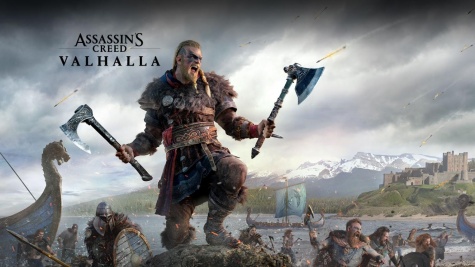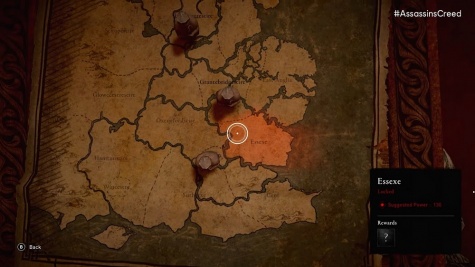
Lucas Rapeepat | Sports Editor
December 4, 2020
After taking a one year break from their annual release of an Assassin’s Creed game, Ubisoft returned in style with Valhalla. Expanding on the newer open world RPG format of the latest two additions, Origins and Odyssey, Valhalla skillfully refines the issues within those games, such as the repetitive side quests and level grinding. It is a brutal, engaging masterpiece, that effectively simulates the harsh realities of the time period.
Set in Dark Age Europe, the latest installment follows a viking warrior Eivor and their adoptive brother Sigurd as they abandon their Norwegian clan in search of glory, riches, and power in England. Like Odyssey, you can choose between male and female Eivor, but you have the option to switch freely between them, with little to no impact on the story. There is also a third option, which lets the Animus change the gender according to story events, but I found this to break the immersion, and recommend sticking with one.
Once reaching England, a large focus of the game is on your Viking settlement, Ravensthorpe. Over time, you gain materials through raids on monasteries in order to construct buildings such as a forge or a tattoo shop that develop the settlement and give you perks and small side quests that allow you to interact with other inhabitants. As a haven for Eivor after constant gore and combat, Ravensthorpe is a nice niche in the dangerous, action-packed plains of England, and serves its purpose well.
Most of the story occurs outside of this haven, however, in the tumultuous landscapes of war-torn England. Divided up into 15 shires, or regions, the nation is absolutely massive, and packed with things to do.
From the foggy marshes of East Anglia to the lush plains of Mercia, the world is breathtakingly beautiful and filled with content to explore. Although it is not as easily recognizable as the Hellenic temples of Ancient Greece or the massive Pyramids of Giza, it possesses a captivating eeriness that is still incredibly fun to explore. Smaller territories such as Asgard and Jotunheim the realms of mythical beings, serve as interesting interjections to the primary storyline. Valhalla successfully blends history and mythology to create an accurate simulation of the setting while adding components of Norse lore. “I loved how there are both accurate representations of English society and life as well as mythical monsters or gods of Norse legends,” junior Evan Lipofsky said. “It’s really fun to dabble between the realistic and the fantastical.”

To establish their position in England securely, Eivor and his clan has to negotiate alliances with each of these shires in 3-5 hour storylines chosen by an Alliance Map in your settlement. Although breaking up the story into numerous pieces seems janky and compressed, characters reappear in different arcs. The narrative is consistently engaging and entertaining, from hunting a fleeing monarch to rooting out a trio of corrupt members of the urban metropolis of London. In addition to this storyline, a sinister cult that is negatively influencing England from behind the scenes needs to be eliminated by Eivor’s hidden blade. The entire adventure is tense and gripping, with difficult choices that directly affect the ending you will earn.
The theme of Vikings is in perfect alignment with the chaotic, brutal combat. Animations are vicious and graphic, with heads and limbs often being detached from bodies. The capability to dual wield any pair of weapons in the game allows for high levels of customization in the speed and style of murder. The wide variety of enemies do not serve as sponges who take unrealistic levels of damage, and are satisfyingly decimated. Often, I would refrain from sneaking around encampments and picking off Saxons one by one, and instead charged in slashing and chopping. Plenty of abilities that drain an adrenaline bar, as well as skills that can be unlocked in a constellation of a skill tree enrich the systematic destruction of your opponents and keep battle refreshing and enjoyable.
Abilities and gear are earned in a different way than previous games. Each piece is unique in the world, and must be hunted for. Every single weapon or armor set can be upgraded to the same rarity, so if you love the way an early game tool plays, you can keep it for the rest of the experience. Though this makes finding new gear far more satisfying than constantly being bombarded with items, I would love to see more of it. However, this should hopefully be addressed in future updates.
Side content is also handled differently. Three categories exist as points of interest, and the amounts of them in each region are depicted in the world map. Wealth describes the locations of abilities and gear discussed above, as well as ingots that are used to upgrade weapons. Artifacts are other collectibles that have a lesser impact on your character. Finally, mysteries entail wacky world events, boss fights against legendary animals or lost heroes, puzzles, or much more. These mysteries are extremely enjoyable, quick tasks that serve as refreshing breaks from the main adventure.
The leveling system that caused so many players to complain about needing to grind to advance has been replaced by a power system. Certain regions are recommended for a certain power level, but it is not impossible to survive in them. In addition, gaining skill points is extremely easy and I have never had to grind to visit a different area that I wanted to.
Assassin’s Creed Valhalla stuffs hours upon hours of content into a picturesque world. With a greatly written protagonist, romping around assaulting, raiding, pillaging, and slaughtering never gets old. Although there are some small flaws, the countless positives make this game a must-purchase for fans of the genre. “The seemingly endless possibilities will keep me engaged for hours,” junior Michael Milner said. “This is the best game I’ve ever played.”

Leave a Reply